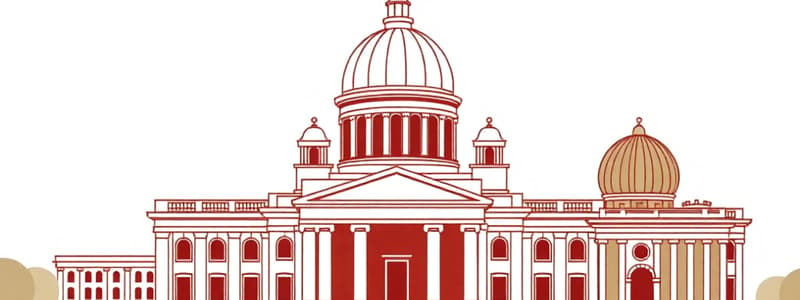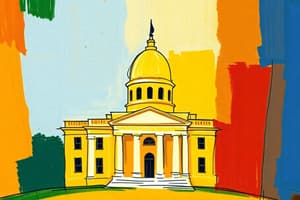Podcast
Questions and Answers
What does the Constitution define?
What does the Constitution define?
The Constitution defines the principles and rules of the government.
What are the two types of centralization of the government?
What are the two types of centralization of the government?
- Monarchy and Republic
- Democracy and Dictatorship
- Centralism and Decentralism
- Unitarianism and Federalism (correct)
Which branch of government interprets the law?
Which branch of government interprets the law?
- Executive
- Legislative
- Administrative
- Judicial (correct)
What is a supernational institution?
What is a supernational institution?
What is an intergovernmental institution?
What is an intergovernmental institution?
Which of the following is NOT a difference between supernational and intergovernmental institutions?
Which of the following is NOT a difference between supernational and intergovernmental institutions?
Which of the following is a characteristic of policy actors?
Which of the following is a characteristic of policy actors?
Which of the following is a public actor?
Which of the following is a public actor?
Which of the following is NOT a private actor?
Which of the following is NOT a private actor?
What is an epistemic community?
What is an epistemic community?
What is a meritocratic system?
What is a meritocratic system?
What is a spoils system?
What is a spoils system?
A meritocratic system is based on political loyalty.
A meritocratic system is based on political loyalty.
A spoils system is based on expertise and technical skills.
A spoils system is based on expertise and technical skills.
Flashcards
Constitution
Constitution
Defines principles and rules of the government
Unitarism
Unitarism
One single central government holds all the power.
Federalism
Federalism
Power is shared between different levels of government (e.g., federal, state, local).
Legislative branch
Legislative branch
Signup and view all the flashcards
Executive branch
Executive branch
Signup and view all the flashcards
Judicial branch
Judicial branch
Signup and view all the flashcards
Supernational institutions
Supernational institutions
Signup and view all the flashcards
Intergovernmental institutions
Intergovernmental institutions
Signup and view all the flashcards
Supernational
Supernational
Signup and view all the flashcards
Intergovernmental
Intergovernmental
Signup and view all the flashcards
Capability
Capability
Signup and view all the flashcards
Perception
Perception
Signup and view all the flashcards
Preferences
Preferences
Signup and view all the flashcards
Executive branch
Executive branch
Signup and view all the flashcards
Ministerial structures
Ministerial structures
Signup and view all the flashcards
Interest groups
Interest groups
Signup and view all the flashcards
Epistemic community
Epistemic community
Signup and view all the flashcards
Meritocratic system
Meritocratic system
Signup and view all the flashcards
Spoils system
Spoils system
Signup and view all the flashcards
Meritocratic vs. Spoils system
Meritocratic vs. Spoils system
Signup and view all the flashcards
Epistemic community
Epistemic community
Signup and view all the flashcards
Unitary system
Unitary system
Signup and view all the flashcards
Federalism
Federalism
Signup and view all the flashcards
Policy influence
Policy influence
Signup and view all the flashcards
Perception of social problems
Perception of social problems
Signup and view all the flashcards
Preferences
Preferences
Signup and view all the flashcards
Policy implementation
Policy implementation
Signup and view all the flashcards
Executive
Executive
Signup and view all the flashcards
Ministerial structures
Ministerial structures
Signup and view all the flashcards
Interest groups
Interest groups
Signup and view all the flashcards
Policy making
Policy making
Signup and view all the flashcards
Policy authority
Policy authority
Signup and view all the flashcards
Study Notes
Constitutional Principles and Government Structures
- A constitution defines the principles and rules for a government's operation.
- Centralization of government can occur in two ways:
- Unitarianism: A single, central government holds all power.
- Federalism: Power is divided between multiple levels of government, sharing sovereignty.
- The three branches of power (legislative, executive, and judicial) are crucial for a balanced government. Each branch has a distinct role and limits on another, promoting accountability.
International Institutions and Actors
- Supernational institutions have the power to create and enforce laws directly affecting member states, like the EU. Benefits include addressing transnational issues, but come with a cost of reduced national sovereignty.
- Intergovernmental institutions are formed from voluntary cooperation and coordination among member states without giving up any sovereignty.
- Supernational vs. Intergovernmental institutions can be distinguished by their power structures.
- Sovereignty: Member states give up some vs keep all sovereignty.
- Authority: direct authority vs consensus decision-making.
- Decision-making: Majority voting vs consensus.
Public Policy Actors and Systems
- Policy actors are those that influence policy and share key characteristics:
- Capabilities: Possessing resources and influence.
- Perceptions: Understanding and defining societal problems.
- Preferences: Having goals and values driving participation in the policy process.
- Public actors in policy include the executive branch and specific ministerial structures like those focused on healthcare or education.
- Private actors are interest groups, social movements, and expert communities (epistemic communities), all working to influence policy. Corporations often lobby for their preferred outcomes.
- Epistemic communities are groups of experts who share knowledge and specific approaches to problems.
- Meritocratic systems of bureaucracy are based on expertise and skills.
- Spoils systems are based on political loyalty and connections.
- These two different systems represent contrasting approaches to staffing and managing public administration.
Studying That Suits You
Use AI to generate personalized quizzes and flashcards to suit your learning preferences.




